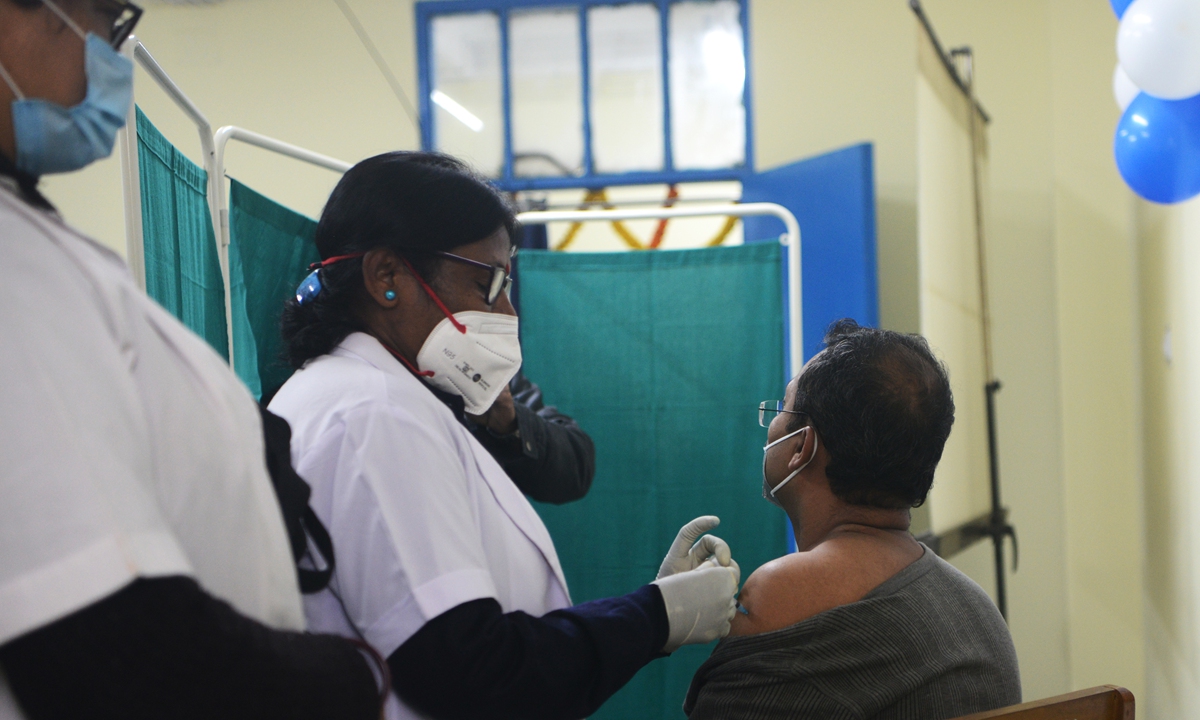India welcomed to ‘help expand global supply’ as it launches mass vaccinations

Photo: AFP
India kicked off on Saturday what the Indian authorities has called the "the world's largest vaccination drive" to bring immunity against the novel coronavirus to its some 1.3 billion people.
Prime Minister Narendra Modi announced the beginning of the first phase of the program, which will last until August, vaccinating 300 million high-risk people, including healthcare and frontline workers, at more than 3,000 vaccination sites across the country, the Times of India reported.
"India begins the world's largest vaccine drive. This is a day of pride, a celebration of the prowess of our scientists and the hard work of our medical fraternity, nursing staff, police personnel and sanitation workers," Modi said during the launching ceremony speech.
"The scale of the largest vaccine drive is unimaginable. It is an ambitious endeavor, aimed at defeating COVID-19 as quickly as possible," he noted.
India recorded more than 100 million COVID-19 cases as of Saturday with more than 152,000 deaths, according to the website of the John Hopkins University of Medicine.
But some experts have warned that limited medical conditions and a high level of population mobility in some rural areas and slums could slow down the planned speed of vaccination.
Vaccines used in the program are the two authorized for emergency use earlier this month - one is Covishield, developed with British-Swedish biopharmaceuticalcompany AstraZeneca and Oxford University, and the other one, Covaxin, is domestically developed by Indian firm Bharat Biotech.
The Indian government signed purchase pacts on Monday with the Serum Institute of India, which is AstraZeneca's Indian manufacturing partner, for 1.1 million doses and for 550,000 doses from Bharat Biotech, according to Indian media.
Doubts over India's domestic vaccines rose as no clear data on their efficacy and safety have been released, but Indian officials have tried to keep the public assured.
"I want to reassure everyone that the vaccine is safe. It is efficacious. We must vaccinate a huge number of people and therefore we can't start being very choosy. We must have confidence in our researchers, scientists and regulatory authorities," All India Institute of Medical Science Director Randeep Guleria told the media on Saturday.
Using the same method, the Covixin should be a no less effective competitor than Chinese inactivated COVID-19 vaccines. Two of China's vaccines have had their interim efficacy released, saying about 79 percent of Sinopharm's candidate and about 78 percent of Sinovac's candidate are effective, according to trials in Brazil.
Brazilian authorities revealed on Wednesday that the late-stage efficacy of Sinovac's candidate is more than 50 percent, local media reported.
Since India announced the authorization for emergency use of its domestic vaccines and declared to begin exports of the vaccines, some Indian media have been hyping up the Indian candidates, saying it may counter international influence and grab the market share of Chinese vaccines.
Brazil has reportedly become the first country to purchase Indian vaccines. A special plane going to India from Brazil was scheduled to collect 2 million Indian vaccines over the weekend, but was delayed due to policy issues, according to the Hindu newspaper.
It is undeniable that India would be a strong competitor to China considering that India has the world's largest vaccine manufacturer and lower costs in labor and facilities, but this does not mean countries buying from India disfavor vaccines developed by China or other countries, as it is a common practice to import vaccines from different countries to expand supply, Lü Mengtao, a medical industry employee, told the Global Times on Saturday.
India makes about 60 percent of vaccines globally and many countries are eagerly waiting for it to begin shipping doses, according to a BBC report.
Chinese vaccine producer Sinovac, whom Brazil signed a contract for 46 million doses with, also called for the issue to be viewed from a more practical perspective as the world is in urgent need of a large supply of COVID-19 vaccines, an employee from the company told the Global Times.
